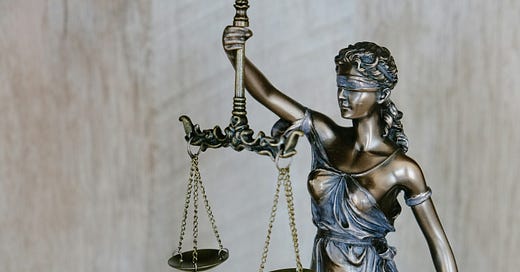The people v judges
Marine Le Pen's election ban is a disaster of her own making, not a judicial coup
The French have a reputation for overreacting, but after a court barred Marine Le Pen from running for president, the hyperbole doesn't seem out of place. "Un scénario catastrophe," said the state-run France Info channel. "Un cataclysme politique et historique," screamed BFMTV (sounds even scarier in the original, doesn't it?)
Politicians were as horrified as journalists when judges hit Le Pen with a ban on holding public office following her conviction for embezzlement. "A dark day for French democracy," thundered Jordan Bardella, the president of her party. Eric Zemmour, a fellow far-right populist, said it was "not up to judges to decide who the people should elect". Politicians across the spectrum agreed. "The decision to remove an elected official should belong to the people," left-wing firebrand Jean-Luc Mélenchon opined. Even Prime Minister François Bayrou, a centrist, said he was "troubled" by Tuesday's ruling.
It is hard not to agree. When the frontrunner to lead a country is prevented from standing, it is terrible news. After three years of political mess, France was looking forward to a 2027 presidential election which might clear the air and provide stability, if nothing else. The ruling will ensure maximum polarisation over the next two years.
Having said that, the talk of a judicial coup heard around the country is overdone. Those responsible for the undoubted catastrophe are not power-hungry judges but politicians – not least Marine Le Pen herself.
The sentence is severe, but so were her crimes. Last year's trial provided abundant evidence of an illegal system which, between 2004 and 2016, enabled her National Rally party to siphon off millions of euros that were supposed to fund EU work. Parliamentary aides paid by Brussels in fact worked full time for the RN. Emails and documents clearly show that Le Pen and other party leaders knew exactly what they were doing.
Few in fact dispute the custodial sentence she received (four years, including two suspended) and her five-year ineligibility ban. What is controversial is the decision by the judges to enforce the sentence immediately, rather than wait for a final ruling on appeal. Under French law, a conviction is considered provisional while the defendant is still challenging it; usually the sentence does not take full effect until the whole process has run its course.
So yes, judges could have decided to hold off on the ban. But should they have? A 2016 law, known as "Sapin 2", provided limited scope for manoeuvre. In cases of embezzlement of public funds, it said, the default was no longer a stay of execution pending appeal, but ineligibility on conviction itself. Judges could decide to hold off but they would have to explain why they had done so.
You might consider that the law is an ass and that a politician found guilty of corruption, like any other defendant, should be treated as innocent while they're still appealing. That is a fair point, but that's not what French legislation says. And that legislation was voted by a huge majority, amid anger over a scandal involving a cabinet minister. The RN did not oppose it.
Still, you could say, the judges might have used their discretion and delayed application of the sentence. Yes, but Le Pen made it difficult for them to do so. Her defence at trial was that the prosecution was politically motivated and that no crime had been committed. She argued that it was normal for parties to use money from the European parliament to fund national activities - although EU law clearly stated otherwise.
On Tuesday, the judges took pains to explain why they had decided to stick with the default position of immediate ineligibility, rather than give Le Pen and her co-defendants the benefit of the doubt. One reason is the risk of re-offending. Those convicted, the court said, had showed "no awareness that they had broken the law and of the importance of integrity."
The other argument was about preserving "democratic public order". This boils down to: unless the highest standard of probity is required of presidential candidates, we're all lost.
Of course, both those points can be contested. As leading conservative Laurent Wauquiez ruefully said, the decision "will weigh very heavily on the functioning of our democracy." He adds: "It's undoubtedly not the route that should have been taken."
As a politician, he would no doubt have chosen a different, democratic course. Le Pen's opponents would much rather that she'd be beaten at the polls. And any reasonable person would hope they'd rather be beaten at the polls by her than have her thrown off the ballot by judicial fiat.
But judges are not bound by politics or even reason, but by the law and the facts. Le Pen is not the victim of partisan justice, but of her own misdeeds and a suicidal legal strategy.
She was also undone by her own past rhetoric. Her father, Jean-Marie Le Pen, gained national prominence by positioning himself as a white knight battling a corrupt establishment. The slogan of his National Front, the RN's ancestor, was "head held high, clean hands" ("tête haute, mains propres.")
Marine played the same card. "French people have had it with sleaze and officials embezzling money," she said in 2004. In 2013 she called for a lifetime election ban for those "who used their mandate to commit crimes". This rule, she suggested, should be enforced in cases of "misusing public funds" and "fake jobs". She continued: "When I call for ethics and morality, I apply this to myself."
Now that Le Pen has been hoist on her own petard, she is singing a different tune: she's up against an iniquitous system of politicised justice. Denouncing judges in the name of the people may play well in these populist times. But it could lead to an even worse "scénario catastrophe" than the one facing France right now.



